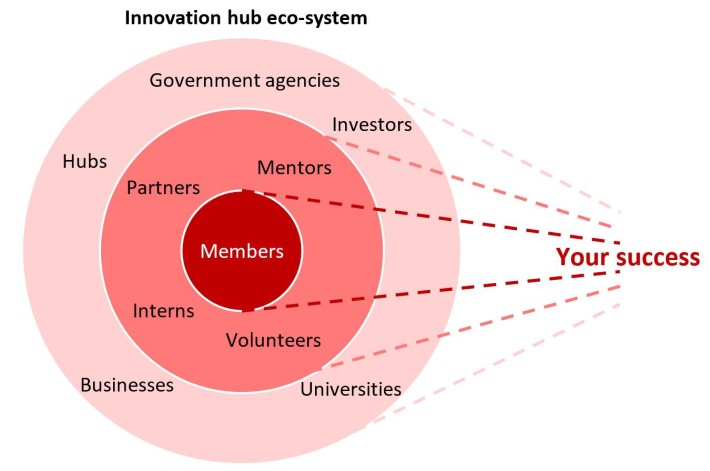Ten things to consider when you join an innovation hub
I have had some great conversations with amazing entrepreneurs in my first week as Community Manager for the Ipswich-based Fire Station 101 innovation hub. There is incredible passion, capability, and ingenuity in a diverse range of communities. These conversations, along with discussions with the other hubs, accelerators, mentors, and investors have me ask:
So what does it mean to be a member of an innovation hub?
I use the term “innovation hub” intentionally as the name implies the purpose behind the reason why people get together. Often referred to as co-working spaces, an innovation hub is focused on defining and executing on some form of innovation.
If we think of it as just a co-working space, there is a risk that the only interest someone has in you is whether you pay your monthly rent and clean up after yourself in the kitchen. This sentiment was summed up by one person involved in hubs who said:
“Working in an innovation hub is more than just four walls and Wi Fi. It is about creating a community with purpose.”
There are multiple communities involved, including:
- the community of members in the hub,
- the community of mentors, partners, volunteers, and interns who are involved with the local hub, and
- the investors, universities, businesses, government agencies, and other hubs that create the local, national, and global innovation eco-system.
When you are a member in an innovation hub, these communities share a common interest: your success.
- Government agencies want the economic development and jobs you bring.
- Investors want a return on their investment in you.
- Universities want to share research outcomes from your new work.
- Businesses want you as a customer and supplier.
- Other hubs want the media attention you will generate.
- Mentors, volunteers, partners, and interns want to be a part of positive outcomes that align with their goals.
- Other members in the hub want to learn from you so they can apply lessons for themselves.
Everyone is watching closely to share with you when you win, encourage you when you struggle, and learn with you when you fall. The expectation of you is that you then give back to the community that supports you to collaborate and share just as they have shared with you.
What we will chat about
If this sounds like it might interest you, here are a few things that may come up in your initial chat with an innovation hub:
1. I probably won’t sign your non-disclosure agreement (NDA)
Before you ask someone to sign an NDA, have a read of this Y-Combinator hacker news thread on the topic: No I won’t sign your NDA, here’s why
Execution is valued over ideas. I am not a lawyer and will not give legal advice. There are times when pending patents and investments in intellectual property necessitate contractual agreements. You should also use common sense when sharing ideas with direct competition who are already executing on ideas in similar fields as yours.
But there is likely not much to protect in a very early-stage start-up that has no customers or code. In these instances, there are two ways you can ensure no one will steal your idea: First, run so fast in executing your idea that others will have difficulty catching up. Speed is everything. Another good way to prevent theft is to do nothing, so there is nothing of value to steal.
Another point is that I am in the business of running an innovation hub. You have your great start-up idea, this hub is mine. I do not have the desire or energy to execute on your idea. I am investing all of my attention into my dream of building community through innovation, just as your dream needs to take all of your attention.
Finally, we have a standard confidentiality agreement as part of membership. If hubs were to sign NDAs, we would not be able to talk to anyone after signing NDAs for around ten projects. If we were to steal ideas, it would also get out and the market wouldn’t touch us.
2. What is your business model (and do you have service or capital potential)?
A business model is the pattern you follow to deliver to your customers.
Two broad approaches to business models are service and some form of capital such as a platform or product. A service model is when the outcome of your business is a service to others. When this service is limited by your personal capacity to deliver, such as a someone building websites or offering legal advice, the only way to scale is to replicate you. This makes it tricky for those who may want to invest in your business, as you then become the business’ biggest asset and largest liability.
A capital business model by comparison is one where the business is built on a platform or product that can be scaled and does not need you to scale it. For example, an online platform that allows others to build websites or an online community that provides some form of legal advice.
In my conversations with other hubs, a big challenge they shared was that of striking the balance between members who were service providers and those who were building capital that could be scaled for investment.
Innovation hubs flourish when there are many people building capital, supported by diverse partners who can provide service to support rapid growth.
3. Is it scalable?
While not all start-ups have characteristics to be “born global”, you do need to plan early about what it looks like to expand beyond your immediate geography, add a few decimal places to customer numbers, and reach different market segments. As part of being in a hub, we will clearly identify who your customer is, how your product will be distributed, and what partners you will need.
4. Is it innovative?
I use a simple three-part definition of innovation:
- something new
- that has value
- for a group of people.
When we work together in a hub, we figure out how your project is different to what is being done, how you can increase the value that is delivered, and what it takes to increase the number of people that it impacts.
5. Is it viable?
Your business model needs to be realistic and sustainable at some point. Creating a Facebook competitor is probably not likely to be viable.
Your model should also work with where you are located. If your product supports the agriculture industry and you are based in the city centre, you may need to consider finding a more reginal hub to work out of to be nearer to your initial customers. We can chat about whether your business is viable and, if not, change it before investing too much of your time and energy.
6. What is your core?
There are a lot of moving parts to a business. What is the one thing that defines your idea or business? What is the one aspect of your business that someone would invest in?
When you strip everything back, seeing what remains can help you focus on what is important. It also makes it clear to you, your customers, and your potential investors what you are and what you are not. This may move around a bit in a start-up as it gets refined, so it is good to ask the question often.
7. Do you have domain knowledge?
Starting something new means you are learning all the time. Learning a new domain at the same time as navigating the complexity of a start-up can be exhausting. Having domain knowledge also means you have the industry networks necessary to execute on your idea.
You and/or your team ideally has experience in the field in which you are developing your idea. For example, someone creating an online cat-sitting business who has never owned a pet and hates animals may not be a good fit.
8. Are you all-in?
Entrepreneurship always involves risk. We gloss over the challenges of starting something new in the hype of innovation and million dollar investments. If you are not willing to invest in your idea, it can be difficult for anyone else to take you seriously and invest with you. On the other hand, personal commitment can be contagious and will attract people and resources.
9. Will you back yourself?
One of your biggest threats as an entrepreneur is fear. Fear is embedded into the fabric of our humanity and society. We fear failure, looking stupid, shame, loss of control, being poor, lack of security, and a range of other psychological and social factors. A celebration of your success is a celebration of humanity overcoming a challenge common to everyone.
In an innovation hub, you will have an entire eco-system supporting you in overcoming your fear and being more than you thought you could be. Your main job is to believe in yourself as much as those around you believe in you and acting on that belief.
10. Are you open to learning and being challenged?
One of the good things about having a conversation with someone in a hub is that they have seen a lot of different ideas and they know only a little about yours. This means they should ask lots of questions, and make a few assumptions while challenging some of yours. If you already have all the answers, you probably don’t need to be a part of a hub.
Ignite your fire – join an innovation hub
Don’t feel you need to have the answers to these questions before joining a hub, but these are the questions you should expect someone to ask. Part of membership in a hub is finding the answers. Many people I meet only have a spark of an idea and burning passion. We can work with that, so long as they are willing to go on the journey.
The innovation hub space continues to mature and expand. If you are a start-up or an established business looking to create something new and be challenged, I encourage you to look up your nearest hub to see if there might be a match.
If you are working in a hub or for a hub and have something to add, please share in the comments below.
If you are in Ipswich, Queensland, drop me a line at chad@firestation101.com.au and let’s see if we can ignite something amazing.



